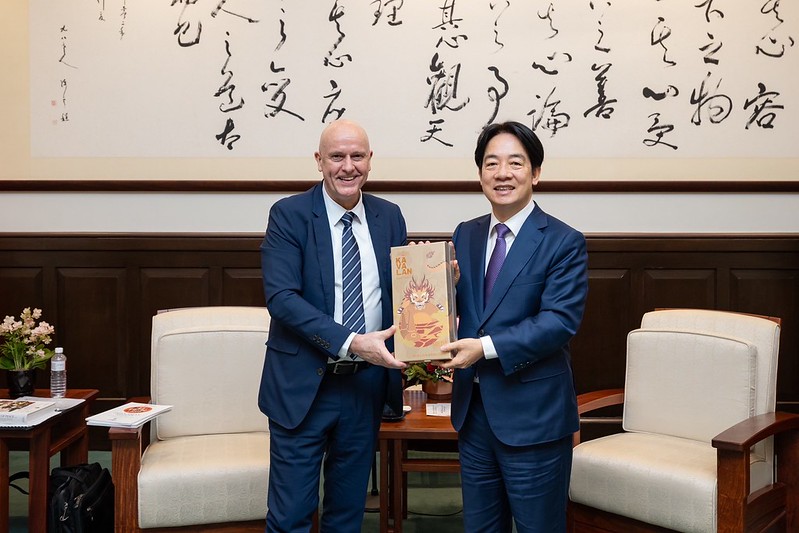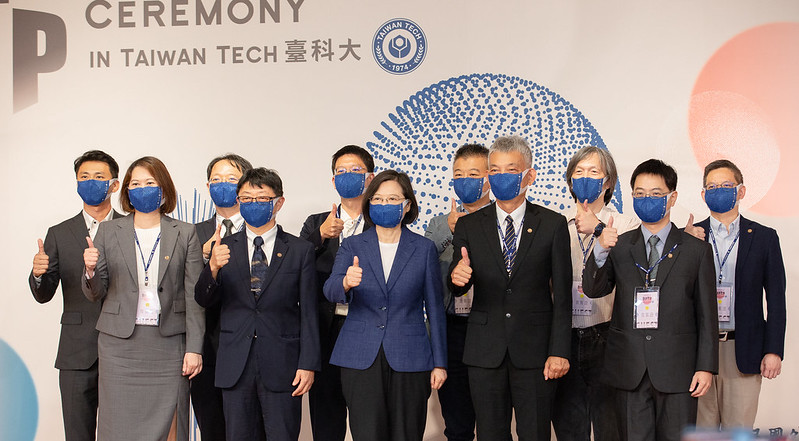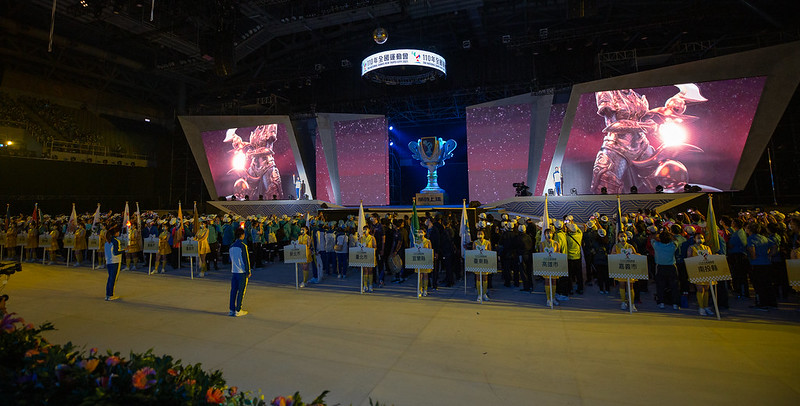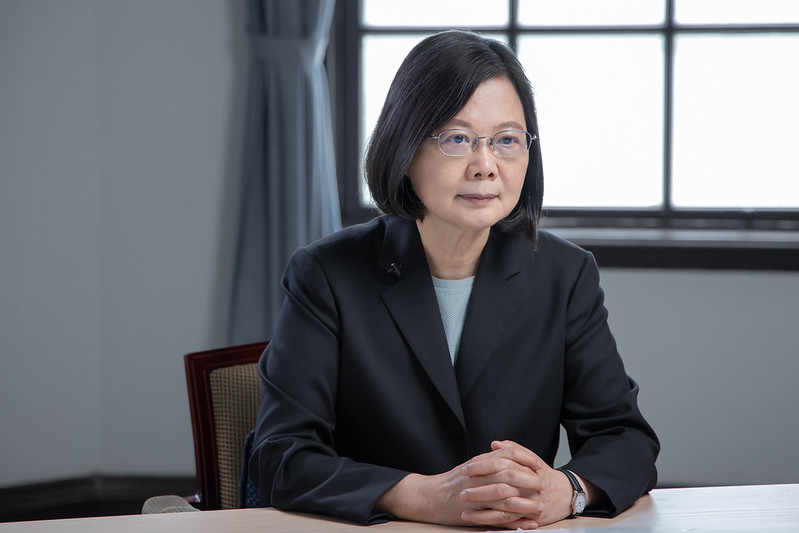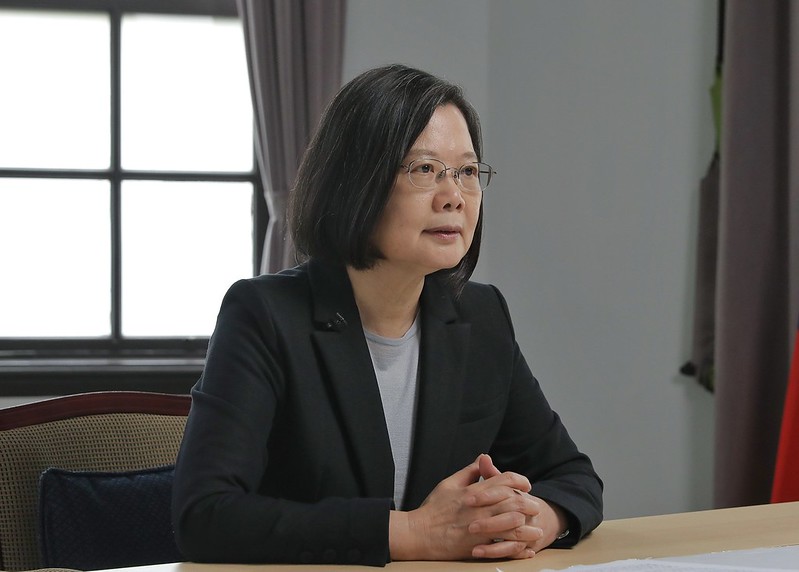News & activities
 News releases
News releases
President Tsai Ing-wen met on the afternoon of August 31 with Taiwan athletes, coaches, and staff who participated in the Taipei 2017 Summer Universiade. She praised the hard work and outstanding performances of the athletes, and called on all young people with a passion for sports to participate in sports association operations, working together to create a more sound system to support the growth and development of athletes. Over the next four years the government will also allocate NT$10 billion so that athletes will have even better training and better care, and more opportunities to display their abilities.
In remarks, the president stated that during the Universiade, all Taiwanese cheered when our athletes won, but when someone lost, a lot of people cried in disappointment. "That is a united Taiwan," she said.
The president mentioned how table tennis player Chen Szu-yu (陳思羽) and her teammates won the bronze in the women's team event, and how her teammate Cheng I-ching (鄭怡靜) won the silver in women's singles. "You were all great! Although, like all of you, I was a little disappointed, it doesn't matter, next time we will definitely succeed!"
The president also named quite a few of the other athletes who had outstanding performances, including women's weightlifter Kuo Hsing-chun (郭婞淳), who broke the world record. "That lift of yours united all the people of Taiwan." Addressing Kuo's fellow female weightlifter Hung Wan-ting (洪萬庭), who also won a gold medal, the president said: "You were great." She also praised both women's coach, Lin Geng-neng (林敬能 ), for the remarkable job he did. She also mentioned Yang Chun-han (楊俊瀚), who took gold in the 100-meter dash, defeating the silver medalist by 0.02 seconds, as well as Taiwan's "dynamic javelin duo"—Cheng Chao-tsun (鄭兆村), who took the gold, and Huang Shih-feng (黃士峰), who won the bronze. "Chao-tsun, you are really amazing. You are the first Asian athlete to break the 90-meter barrier, which is a genuine 'Asian miracle.'" She also mentioned gymnast Lee Chih-kai (李智凱), who won a gold medal on the pommel horse, and thanked Coach Lin Yu-hsin (林育信), who watched over Chih-kai the whole way as he grew up.
Speaking in Taiwanese, the president also thanked tennis player Jason Jung (莊吉生) for representing Taiwan in the competition, winning the gold in men's singles. As for the women's volleyball team, although they did not win a medal this time, their fighting spirit touched the people of Taiwan. The president also mentioned the biggest medal winners, the roller sports team, which won 10 golds, 11 silvers, and two bronzes. She said that she went to the competition site to see roller athletes Yang Ho-chen (楊合貞) and Li Meng-chu (李孟竹), who sped right past her. As they crossed the marathon event finish line in first and second place, said the president, "I believe that, like me, a lot of people will remember that feeling of speed and pride for their whole lives."
The president pointed out that not only athletes who participated in this Universiade, but also coaches, medical teams, and all the support staff who did logistic work behind the scenes, were indispensable and important contributors and heroes.
The president said that she could not name one by one all the athletes from archery, basketball, wushu, billiards, water polo, and taekwondo because the athletes were scheduled to go out on parade and she didn't want to make people wait too long. This competition, said the president, was held for the athletes, and all the glory belongs to them. "In a little while, when everyone walks out of the Presidential Office Building, you will hear the cheers of the people of Taiwan. Enjoy these cheers to the fullest, because they belong to you, and this summer has been your summer."
Noting that Taiwan had won 26 gold medals, 34 silvers, and 30 bronzes in this Universiade, the president said that every medal shows that if we don't set limits on ourselves, then there are no limits for Taiwan and its people. No one can block our determination to move forward, and we will overcome any difficulty, no matter how great. Today, she said, the Legislative Yuan also contributed to the task at hand and finally passed an amendment to the National Sports Act after countless difficulties. This is only a start, she said, and demonstrates the government's determination to carry out sports reform.
Commenting on the successful amending of the law, the president specially thanked the athletes. The fighting spirt they showed at the competition boosted the effort to amend the law. They persisted to the very end in their respective events, and sports reform should also take a big step forward. "Because if we don't reform, we won't be able to face you."
The president pointed out that the various sport associations are here to help athletes, not to monopolize resources. Associations that cannot look after their athletes will have to be reformed. If an association cannot encourage and assist its athletes, we should allow young people into them to bring all their passions into play. So in the future, athletic associations have to be more just, more open, and more transparent. President Tsai called on all young people with a passion for sports to participate in individual sports association operations to work to create a more sound system to support the growth and development of athletes.
The president mentioned that athletes may say that they work very hard, but what can the government really do? She pointed out that, in addition to the Legislative Yuan passing the amended National Sports Act, the government also wants to put a budget in place so that athletes will have better training, better care, and more opportunities to display their abilities.
President Tsai pointed out that, in addition to the public budget and the Sports Development Fund, over the next four years the government will also allocate NT$10 billion to support sports development as part of the recently passed Forward-Looking Infrastructure Development Program. Of this sum, the government will invest NT$3.6 billion in the second half of this year and into next year. Next year, the government will also allocate an additional NT$580 million to the Sports Development Fund. This will be a resource for investment in tangible and intangible infrastructure, education and training, and incentives and subsidies, and that budget will steadily increase. Simply put, overall sports expenditures next year will increase over this year, and in the future, overall expenditures will double sports expenditures within eight years and make her campaign promise a reality, though we will try our best to achieve this goal within four years, she said.
President Tsai stated that the next big sports events are going to be the Asian Games in Indonesia and the Olympics in Tokyo. If government, business, sports associations, and all citizens provide backing, she said, Taiwan's athletes will once again make the world sit up and take notice.
President Tsai again congratulated all the athletes for adding a brilliant chapter to their young lives, and thanked them for thrilling Taiwan over the course of 12 days. Many years in the future, she said, when we think back on the summer of the 2017 Universiade, we will remember it as a summer of passion, filled with the sounds of fans cheering: "Go Taiwan!"
The president also said to badminton competitor Tai Tzu-ying (戴資穎): "Thank you for staying in Taiwan to compete at the Summer Universiade." She stated, "Just as you said, the power of everyone uniting together left behind many incredible stories from this Universiade. The biggest thing we realized this summer is that Taiwan can be united, with everyone pulling together."
Finally, the president gave all the athletes in attendance sports towels inscribed: "You make our country great," which were accepted on behalf of all the athletes by badminton women's singles gold medalist Tai Tzu-ying and pommel horse gold medal winner Lee Chih-kai. Weightlifter Kuo Hsing-chun also gave the president a set of commemorative badges on behalf of the athletes.
After the end of the competition, the Ministry of Education's Sports Administration and the Taipei City government jointly held a special Taiwan's Heroes Parade so citizens could come out and share the athletes' glory and joy. The parade started off at the Presidential Office Building, so President Tsai posed for a commemorative group photo with the athletes, and walked with them to the entrance porch at the main entrance to the Presidential Office Building, the parade’s starting point. There, together with the welcoming crowds who lined the street in front of the building, she cheered the athletes, a moment of great pride for all the people of Taiwan.
